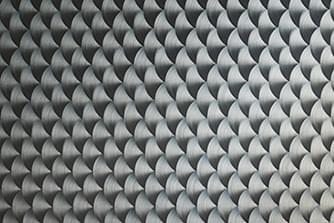1958 S1 Continental Flying Spur – VGX 853
Today’s Bentley Flying Spur owes its name to coachbuilders H.J. Mulliner, whose inspired idea to offer a four-door body on the Continental chassis created the Continental Flying Spur in 1957. The 1958 example owned by the Heritage Collection offered individual, elegant and swift travel for its succession of proud owners, and was acquired by Bentley Motors in 2004.
The S-Series Continental
The S-Series Continental was essentially an updated and improved version of the R-Type template, with a separate chassis, straight-six engine and bodywork by independent coachbuilders. At a time when the standard, factory-bodied S-Series Bentley saloon cost £3,295, owners had to be seriously wealthy to pay more than double for an H.J. Mulliner or Park Ward version. Between 1955 and 1959, 432 S-Series Continentals were bodied by specialist coachbuilders, with H.J. Mulliner accounting for 217. During the same period the factory produced 2,927 standard-body saloons.
The four-door Continental Flying Spur
Most S-Series Continentals were two door models, but H.J. Mulliner backed a hunch that there would be a small but discerning market for a coachbuilt four-door Continental as an alternative to the factory four-door offering. Their design was balanced and elegant, with ample space for four. The new four-door was named by Arthur Talbot Johnstone, H.J. Mulliner’s Managing Director, after the heraldic device of his family, the Clan Johnstone of the Scottish Borders. The first example even featured the Clan Johnston’s spur mascot on its radiator grille. Following the success of the H.J. Mulliner Flying Spur, coachbuilder James Young also offered its bespoke interpretation of a four-door Continental.
The Bentley Collection’s S1 Flying Spur
The S1 Continental Flying Spur in Bentley’s Lineage Collection is a 1958 H.J. Mulliner model with a 180bhp 4.9 litre straight-six engine, finished in black with grey interior. This example has the optional automatic gearbox and air conditioning. It originally cost £8,034, around ten times the average UK salary at the time. It was commissioned by Birmingham-based engineering firm Guest, Keen and Nettlefold (presumably as Chairman Sir William Peacock’s company vehicle), before passing into the Peacock family in 1964. It is gently patinated but in excellent condition and was an inspiration to the design team at Crewe when creating today’s Flying Spur.
| Date Produced | November 1958 |
| Chassis/engine no. | BC9FM / BC9F |
| Body | H.J. Mulliner four-door on Continental S1 chassis |
| Engine | 4,887 cc 6-cylinder in-line. Pushrod overhead inlet, side exhaust valves; cast iron block, aluminium cylinder head; 7-bearing crankshaft |
| Power | 180 bhp @ 4,000 rpm |
| Transmission | Rear wheel drive, single dry plate clutch. 4-speed D type gearbox |
| Chassis | 10’3” wheelbase chassis with steel box section x-braced frame. Independent coil and wishbone front suspension, live rear axle |
| Dimensions | Wheelbase 10’3”; track 58 in (147 cm) front, 60 in (152 cm) rear; length 212 in (538.5 cm); weight 3,895 lb (1,766 kg) |
| Performance | Maximum speed 119 mph |


































































































































